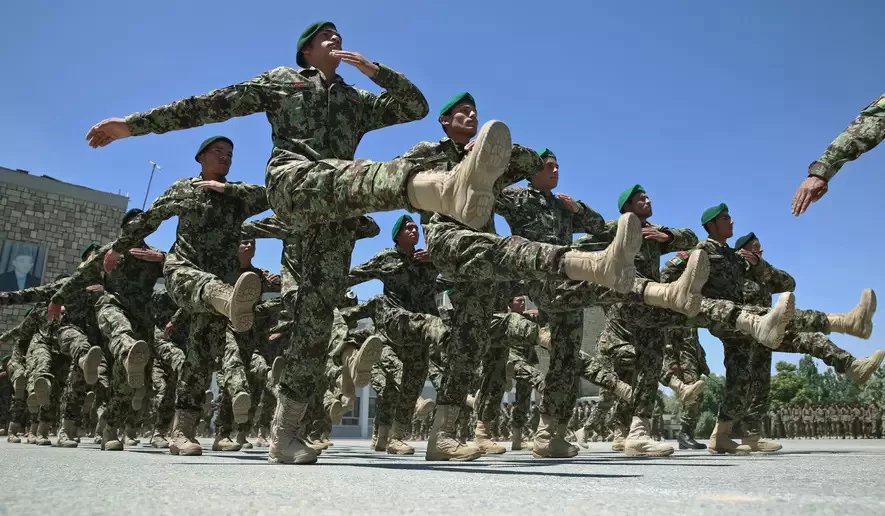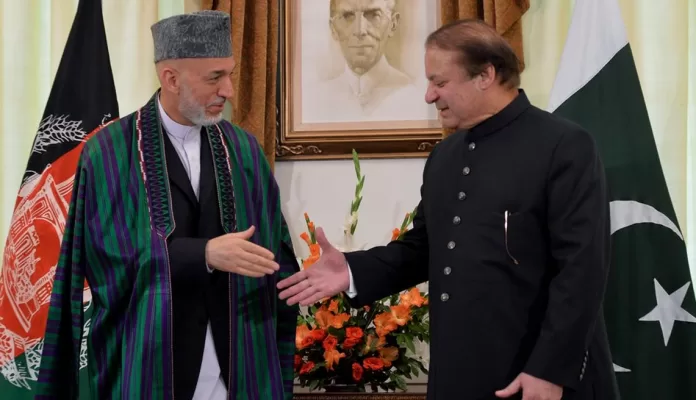Recent Pak-Afghan summit had many interesting features. Before leaving Kabul for Islamabad, President Karzai had said that it would be his 20th visit to Pakistan, and that earlier 19 had not yielded any results. Afghan President’s visit came at a time when Afghanistan is undergoing important political and security transitions.
Draw-down of foreign forces is due to complete by December 2014; however, the key issue of number and role of residual military forces remains unsettled. Despite tall claims, the writ of Afghan National Security Forces does not extend beyond Kabul. Presidential elections are planned for April 05, 2014, in which the incumbent president cannot take part. There are many question marks with respect to the credibility and acceptability of the forthcoming elections. Sham elections of 2009 are still fresh in the public memory. In his Eid message, Mullah Omar had said: “As to the deceiving drama under the name of elections 2014, our pious people will not tire themselves out, nor will they participate in it. He said selection in the polls, “de facto, takes place in Washington”. On the other hand, opposition political parties are contemplating to field a joint presidential candidate to face Karzai’s nominee.
Notwithstanding these uncertainties, consultations during the summit were wide ranging. The two leaders in their one-on-one meetings focused on issues of common interest including strengthening of bilateral ties and the evolving situation in the region. Though differences on immediate security related concern were obvious, there was consensus on moving ahead on long term strategic issues like connectivity, trade and economy. During summit level interactions, the leadership of the two countries was presumably looking at Afghanistan and the region in the context of beyond 2014. Talks focused on the security and related issues of common interest as well as on the common challenges and the huge opportunities for both countries. Pakistan and Afghanistan also signed an agreement to boost volume of trade and strengthen economic relationship.
During his interaction with the media, President Karzai said he had “primarily and with emphasis” asked the Pakistanis to help with reconciliation after the majority of foreign troops leave Afghanistan next year. He added: “We are advancing the cause of brotherhood between the two countries…For the two countries, the primary concern is lack of security for their citizens and the continued menace of terrorism…It is this area that needs to have primary and focused attention from both governments”. Prime Minister Nawaz Sharif responded: “I reaffirmed Pakistan’s strong and sincere support for peace and reconciliation in Afghanistan. We fully agreed that this process has to be inclusive, Afghan-owned and Afghan-led…I assured President Karzai that Pakistan will continue to extend all possible facilitation to the international community’s efforts for the realization of this noble goal.”
President Karzai expected Pakistan to provide opportunities or a platform for talks between the Afghan High Peace Council and the Taliban. “We hope with this we can move forward in bringing stability and peace to both countries,” he said. But there are question marks over what Pakistan can deliver. Taliban have publicly refused to have any contact with Karzai’s government, branding it a puppet of the United States. Analysts say that Pakistan can facilitate Taliban peace talks and help with logistics, but does not have the leverage to compel them to the negotiating table against their will.
President Karzai also wanted the release of all Afghan prisoners who are not facing criminal charges in Pakistan. Pakistan has already freed 26 Afghan Taliban leaders including former ministers and governors since the process started in November last year. Afghan government’s peace negotiators, who accompanied Karzai, called for the release of Abdul Ghani Baradar; there has been no breakthrough on the issue. Reportedly, at this stage Mullah Baradar is also not keen to go to Afghanistan. Afghan officials believe that prisoner releases can encourage the former detainees to talk to the Kabul government, although there is little evidence that such hopes have been realised. Several already released prisoners have returned to the battlefield.
Afghan Analysts Network says that after the Doha fiasco, Kabul is again turning back to Pakistan to get access to the Taliban leadership: “It wants its own channel to the insurgents, independent from the US… Attempts to go through Pakistan are not new. Most similar moves have been unsuccessful in the end,” wrote analyst Borhan Osman. On the prospects of the derailed Doha process and likely venue of future peace talks with the Taliban, the Afghan ambassador to Islamabad Mr. Daudzai had recently emphasised: “Location is not important, what is important is Pakistan’s active participation in the dialogue process.” Pakistan’s facilitation and cooperation in this context are vital, he added.

Beside security related negotiations, finance ministers of Pakistan and Afghanistan held comprehensive discussions aimed at pursuing various economic and connectivity projects. Some of the agreed projects are: rail projects including the establishment of new rail links to connect Torkham with Jalalabad as well as Chaman to Spin Boldak; initiation of highway projects; early implementation of CASA 1000 and TAPI energy projects; and development of a joint hydel power project on the Kunar River. In addition, both sides agreed to the early and full implementation of Afghanistan Pakistan Transit Trade Agreement (APTTA). The two countries had signed this agreement in 2010, which serves as a key instrument for the facilitation of Afghanistan’s access to foreign markets through Pakistani sea-ports and land routes. Both sides are engaged in efforts for optimal utilization of APTTA and its extension to Central Asia.
Bilateral trade between Pakistan and Afghanistan has witnessed an impressive growth in recent years and reached US $2.44 billion in 2012. Pakistan’s exports stood at $2.24 billion, making Afghanistan the third largest destination for Pakistani products. Recognizing the vast untapped potential, the two countries have agreed to expand bilateral trade to US $ 5 billion by 2015.
To support Afghanistan’s reconstruction and socio-economic development, Pakistan has already provided bilateral assistance worth US $ 330 million in diverse fields including infrastructure, health and education. Pakistan has also offered US $ 20 million for the training of Afghan National Security Forces (ANSF).
Moreover, educational facilitation has been growing over the years. More than 7,000 Afghan students are currently studying in Pakistan. Of these, 2,000 are on fully-funded scholarships offered by Pakistan; most others are enrolled under full or partial scholarships. More than 30,000 Afghans have graduated from Pakistani institutions and are now contributing towards Afghanistan’s national development.
There are complications in Pak-Afghan relationship. Afghanistan has since long been accusing Pakistan of playing a double game in the 12-year-old war. Periodic anti-Pakistan rhetoric by senior Afghan officials makes Pakistan cautious with regard to any fresh initiative. The summit has certainly helped in reducing the trust deficit. Though on contentious security related issues both side did not go beyond their previously stated positions, a foundation has been laid for post 2014 strategic partnership between the ‘conjoint twins. Hopefully, this partnership would focus on economic wellbeing and prosperity of the two peoples.




